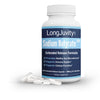

Sodium Butyrate: A Promising Supplement for Ulcerative Colitis
Introduction: Ulcerative colitis (UC) is a chronic condition causing inflammation in the colon, leading to symptoms like diarrhea, rectal bleeding, and abdominal pain. Researchers are exploring new ways to manage UC, and one promising option is sodium butyrate, a compound produced by gut bacteria. The Role of Butyrate: Butyrate is...
Read more

Why Sodium Butyrate is the True "Nature's Ozempic" Over Berberine
In recent months, berberine has captured significant attention as "Nature's Ozempic," with claims of its efficacy in blood sugar regulation and weight loss. However, emerging scientific data suggest that sodium butyrate might be a more deserving candidate for this title. Let's explore why sodium butyrate could be the true "Nature's...
Read more

Unlocking the Power of AKG for Gut Health: A Promising Pathway to Intestinal Wellness
This article summarizes research findings on the health-beneficial effects of α-ketoglutarate in maintaining intestinal homeostasis and explores
the associated underlying mechanisms.
Read more
the associated underlying mechanisms.
A Summary of Emerging Research on AKG and Fertility
Introduction: Alpha-ketoglutarate (AKG) is a naturally occurring metabolite that plays a central role in cellular metabolism. In recent years, there has been growing interest in the potential role of AKG in regulating fertility and fecundity. Animal studies have shown that AKG supplementation can improve fertility in both males and females,...
Read more
Alpha-Ketoglutarate and Weight Loss: What Does the Research Say?
Alpha-ketoglutarate (AKG) is a naturally occurring compound that plays a role in many important metabolic processes, including energy production, protein synthesis, and amino acid metabolism. In recent years, there has been growing interest in the potential of AKG to help with weight loss. There is some evidence to suggest that...
Read more
AKG and Bone Health
Alpha-ketoglutarate (AKG) is an essential intermediate in the tricarboxylic acid (TCA) cycle. It has a number of important physiological functions, including the oxidation of fatty acids, amino acids, and glucose. In recent years, AKG has also been shown to have a number of beneficial effects on bone health. Studies have...
Read more




